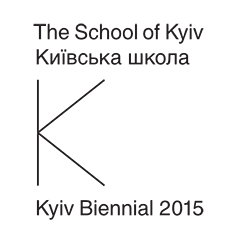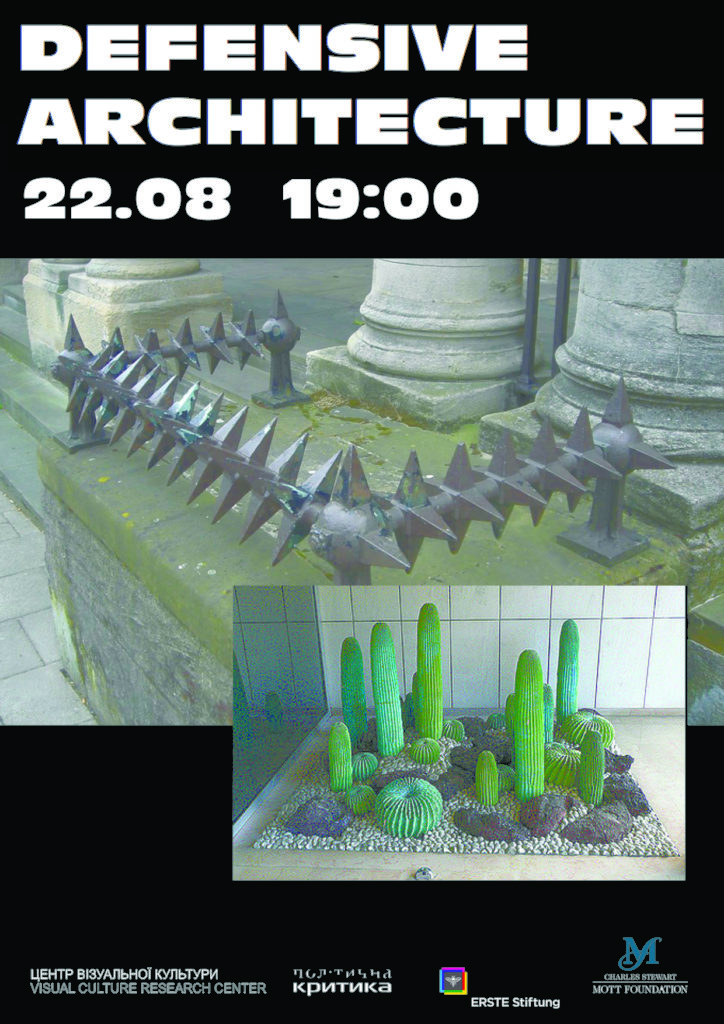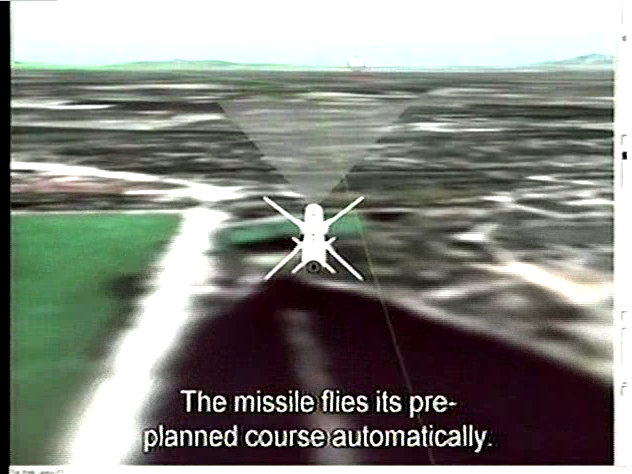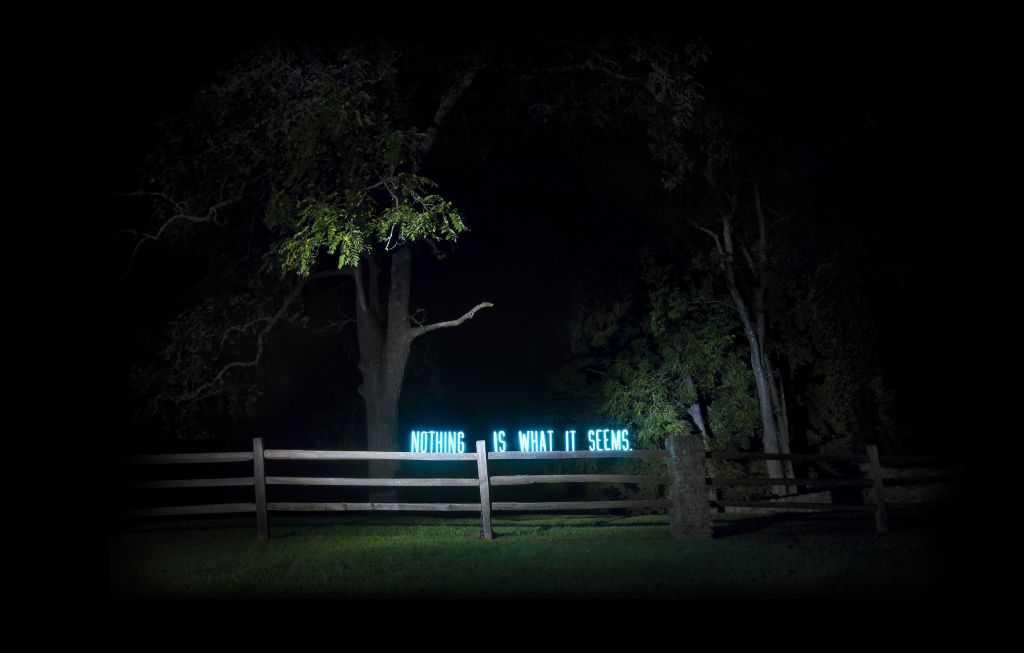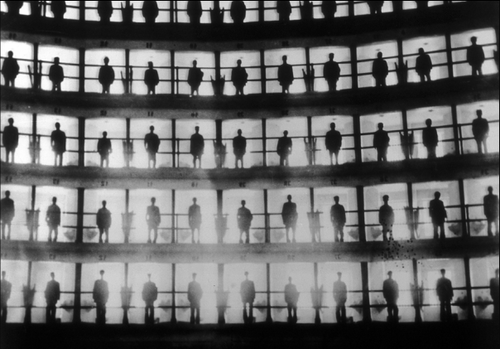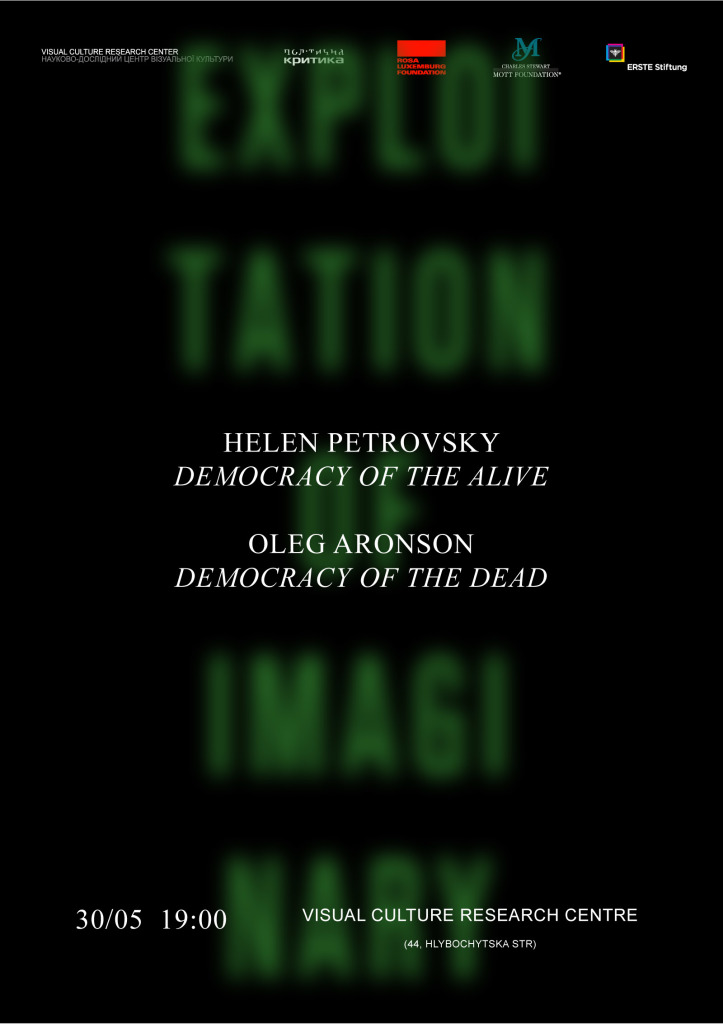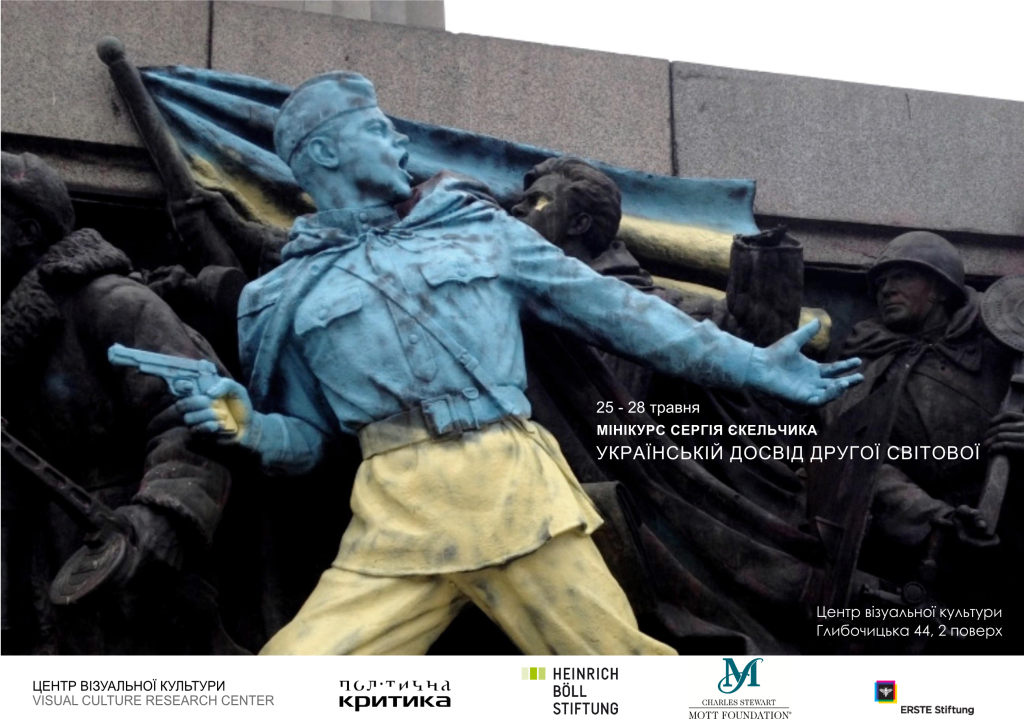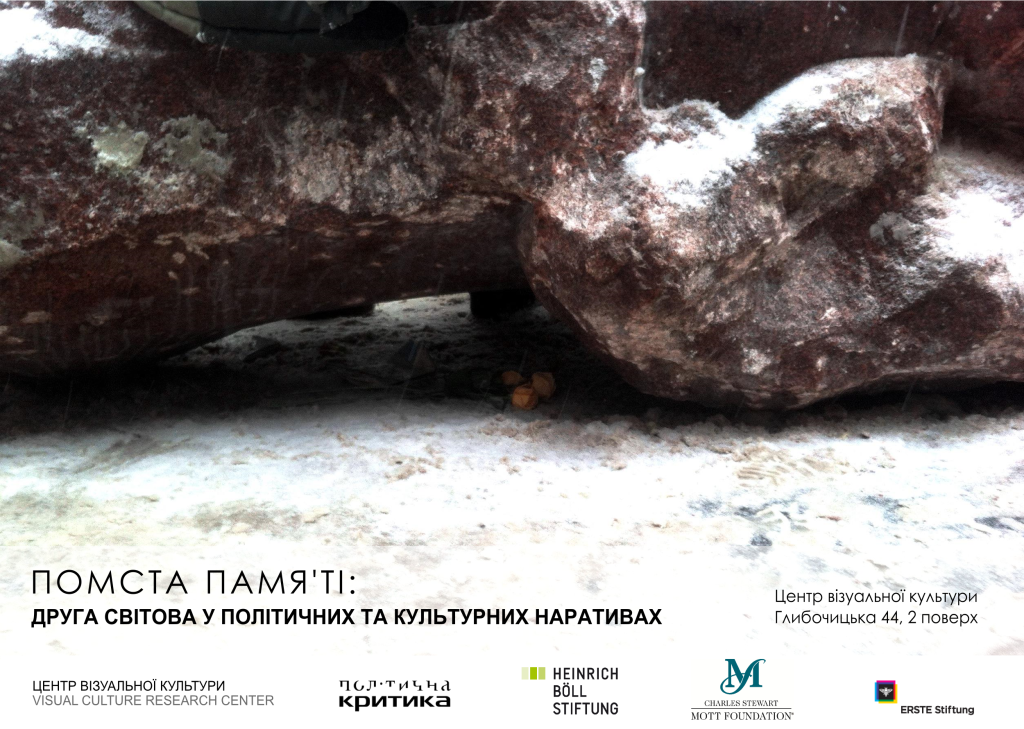DEFENSIVE ARCHITECTURE. Lecture by Lucien Gurbert
August 22, 2016 19:00
Lecture by Lucien Gurbert
DEFENSIVE ARCHITECTURE AND «CRIME PREVENTION THROUGH ENVIRONMENTAL DESIGN». Between police fantasies and urban reality
In the streets of many metropolises of the western world, a new kind of urban furniture is emerging. In Brussels, London, Paris, Toulouse or Nantes are growing spikes, pins, blocks, fences, inclined surfaces, diced public benches, CCTVs and many other technological control and surveillance tools. All of these devices aim to a single purpose : excluding a range of the citizens apart from the public space, as unwanted individuals. These “defensive devices” do not only stigmatize persons, such as beggars or homeless people : they mainly deter the “bad” practices, and therefore indirectly express the good practises one must follow to stay a reasonable citizen : not lying on the streets, not skateboarding, not begging, etc.
A threat of defensive devices, emerging in our cities, prevents people from the use of public space, increasing the number of brands in the urban landscape and serving as an instrument for police brutality.
Lucien Gurbert – Architectural Bureau “Vendredi” Nantes France, art member of the collective ”Radio as Paper”.
Supported by: ERSTE Stiftung and Charles Stewart Mott Foundation
.
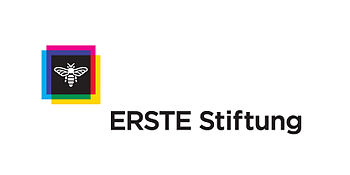
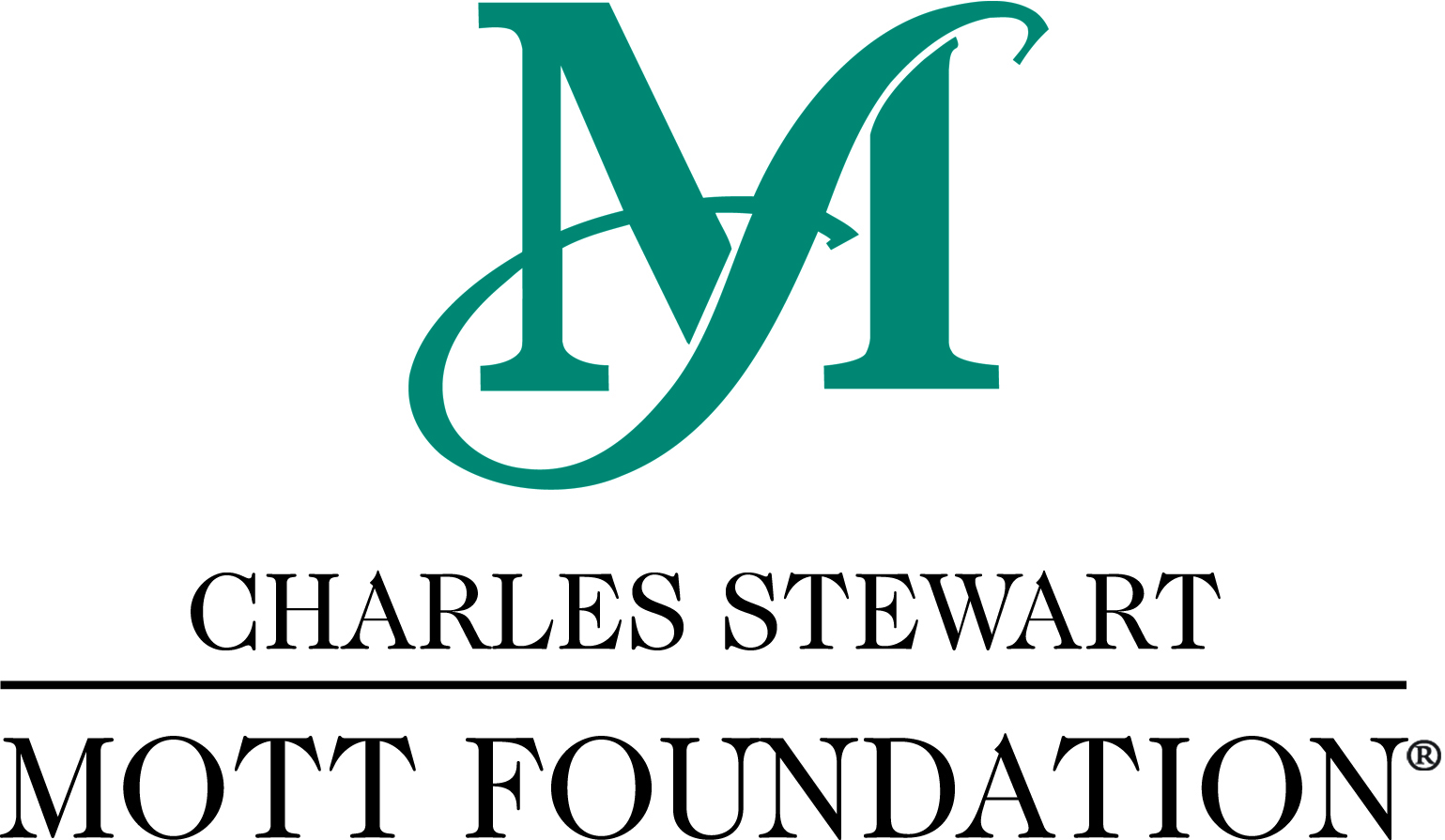
Contacts:
+380639535143 Natalka Neshevets
Fb: VCRC
NEEDS. The first Petr Pavlensky’s talk out of prison
The Violence of the Image. Lecture by Lesia Kulchynska
Jakub Majmurek. TOWARDS A TOPOLOGY OF ESSAY FILM
Sunday, 20 March 2016, 18:00
Lecture by Jakub Majmurek (Warsaw)
Towards a Topology of Essay Film
Visual Culture Research Center and Political Critique invite to the lecture Towards a Topology of Essay Film by Jakub Majmurek.
In this lecture, Jakub Majmurek will outline a project for a topology of a specific film genre, which is an essay film. Starting from a historical, genealogical perspective, he will define essay film as a heterogenic form, bounded by strongly blurred frontiers. The heterogeneity in question can be found both in the formal aspects of essay films as well as in the range of topics and social contexts that form is taking. Mapping the frontiers of a genre of film essay would be crucial for this topological endeavor. The lecture will describe how essay film – as an artistic practice stemming from a field of cinema – is articulating itself in relation with other fields of social practices. A special emphasis will be put on three social fields – that of politics, that of art (or art-world) and that of science.
Jakub Majmurek is a philosopher, film critic, and political commentator. He regularly contributes to Wirtualna Polska, Krytyka Polityczna and other publications. He is an editor and co-author of numerous publications on topics ranging from political philosophy (among others, L’idée du communisme II) to cinema and contemporary art (most recently – Polish Cine Art).
The lecture will be delivered in English.
Admission is free
Picture: Harun Farocki. War at Distance (2003).
Supported by Ministry of Culture and National Heritage of Poland
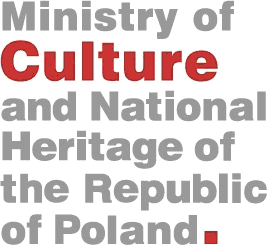
Supported by ERSTE Stiftung та Charles Stewart Mott Foundation:


Visual Culture Research Center (VCRC) was founded in 2008 as a platform for collaboration between academic, artistic, and activist communities. VCRC is an independent initiative, which is engaged in publishing, artistic activities, research, organization of public lectures, discussions, and conferences. In 2015 Visual Culture Research Center received the European Cultural Foundation’s Princess Margriet Award. Visual Culture Research Center was also an organizer of The School of Kyiv – Kyiv Biennial 2015.
Visual Culture Research Center (44 Hlybochytska Street, 1 floor)
Contacts:
+380676695457 Ganna Tsyba
+380639535143 Natalka Neshevets
www.facebook.com/vcrc.org.ua
vcrc@vcrc.org.ua
The Violence of the Image. Lecture by Lesia Kulchynska
Wednesday, 17 February 2016, 19:00
Lecture by Lesia Kulchynska
The Violence of the Image
Visual Culture Research Center and Political Critique invite you to the lecture by Lesia Kulchynska, that will take place on Wednesday, 17 February, at 19:00.
The most terrifying thing about horror films is that the horror haunts us even after the end of the movie. Why does screen, that separates us from the horrible, appears to be penetrable for fear? Why do we feel helpless before the image, even if we are physically safe? In order to protect ourselves, we have to close our eyes. But even this does not always help. Some images are so dangerous that they have to be destroyed. Why do people fight with images? How can “just an image” be threatening? What exactly is under threat? Is fear of the image an attribute of naïve consciousness, or is there actually something to be afraid of?
Lesia Kulchynska, PhD, is a curator, cultural and film theorist at Visual Culture Research Center.
The lecture will open a new season at Visual Culture Research Center, which is a conceptual continuation of ideas, practices and projects, initiated by The School of Kyiv – Kyiv Biennial 2015.
Admission is free
Photo: Olivia Steele. Nothing Is What It Seems, 2014.
Supported by ERSTE Stiftung та Charles Stewart Mott Foundation:


Visual Culture Research Center (VCRC) was founded in 2008 as a platform for collaboration between academic, artistic, and activist communities. VCRC is an independent initiative, which is engaged in publishing, artistic activities, research, organization of public lectures, discussions, and conferences. In 2015 Visual Culture Research Center received the European Cultural Foundation’s Princess Margriet Award. Visual Culture Research Center was also an organizer of The School of Kyiv – Kyiv Biennial 2015.
Visual Culture Research Center (44 Hlybochytska Street, 1 floor)
Contacts:
+380676695457 Ganna Tsyba
+380639535143 Natalka Neshevets
www.facebook.com/vcrc.org.ua
vcrc@vcrc.org.ua
Lecture by Katarzyna Szymielewicz
Thursday, 4 May 2015, 19:00
The Internet after Snowden: Do We Have Something to Hide?
Visual Culture Research Center (44 Hlybochytska Street (1st floor), Kyiv)
On Thursday, 4 June, at 19:00 the lecture by Internet security researcher Katarzyna Szymielewicz will take place at Visual Culture Research Center.
What have we learned from Edward Snowden about contemporary methods of surveillance? What is the problem with protection of privacy in the “society of the spectacle”, where we continually expose our lives to others? What is the role of private capital in the system of control over our communication and life in the network? To which threats on the part of private corporations leads the loss of control over data? Can freedom be the price we pay for security? What is to be done for keeping control over information and freedom in the digital world?
Katarzyna Szymielewicz is a researcher of Internet security, author, and lawyer. She is a Head of Panoptykon Foundation (Warsaw), which deals with the protection of Internet user’s rights. She was one of the initiators of European movement against ACTA agreement.
More information: https://en.panoptykon.org/
Working language – English
Admission is free
On Friday, 5 June, from 10:00 to 14:00 Katarzyna Szymielewicz will hold a workshop on theory and practice of Internet security. Main issues to be discussed during workshop:
– Definition of privacy (what can be considered private / vulnerable?);
– Mapping of contexts in which we publish personal information (work, life in the network, relations with the state); identification of subjects, who have / might have the access to such information, as well as related risks;
– What is the essence of profiling based on our Internet data, and in what way it threatens political activists;
– Review of alternative (secure) communication services.
In order to participate in the workshop, please send the motivation letter to the address vcrc@vcrc.org.ua.
Supported by ERSTE Stiftung and Charles Stewart Mott Foundation


Visual Culture Research Center (VCRC) was founded in 2008 as a platform for collaboration between academic, artistic, and activist communities. VCRC is an independent initiative, which is engaged in publishing and artistic activities, scientific research, organization of public lectures, discussions, and conferences. In 2015 Visual Culture Research Center received the European Cultural Foundation’s Princess Margriet Award.
Contacts:
+38096 4929600 (Nataliya Neshevets)
www.facebook.com/vcrc.org.ua
vcrc@vcrc.org.ua
Oleg Aronson and Helen Petrovsky
Saturday, 30 May 2015, 19:00
“Democracy of the Dead” and “Democracy of the Alive”
Visual Culture Research Center (44 Hlybochytska Street (1st floor), Kyiv)
Visual Culture Research Center and Political Critique invite you to the lectures by Oleg Aronson and Helen Petrovsky, which will take place on Saturday, May 30, at 19:00.
Democracy is usually understood as a form of political rule. However, even in such terms it is quite unstable, contradictory and looks rather like a social utopia than effective political mechanism. Moreover, democratic rhetoric, which refers to the values of liberty, equality, and justice, became a part of contemporary politics, a way of its self-representation. Meanwhile, we can conceive democracy in a different way – by pointing to some of its manifestations, which are resistant to politics and even incompatible with it. Oleg Aronson and Helen Pertovsky will address these issues in their short lectures – “Democracy of the Dead” (about the relation of democracy to war and formation of mass society) and “Democracy of the Alive” (about the logic of multitude, in which action confronts political imagination).
Oleg Aronson is an art historian, film and media theorist, philosopher. He is a fellow researcher at the Institute of Philosophy (Russian Academy of Sciences).
Helen Petrovsky is a philosopher, anthropologist, cultural theorist. She is editor-in-chief of “Siniy Divan” magazine.
Lectures will take place at Visual Culture Research Center within the frameworks of the exhibition “Some Say You Can Find Happiness There” and “Exploitation of the Imaginary” project (May 20 – June 15, 2015).
Admission is free
The project is supported by Rosa Luxemburg Stiftung
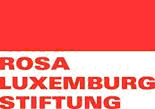
Supported by ERSTE Stiftung and Charles Stewart Mott Foundation


Visual Culture Research Center (VCRC) was founded in 2008 as a platform for collaboration between academic, artistic, and activist communities. VCRC is an independent initiative, which is engaged in publishing and artistic activities, scientific research, organization of public lectures, discussions, and conferences. In 2015 Visual Culture Research Center received the European Cultural Foundation’s Princess Margriet Award.
Visual Culture Research Center (44 Hlybochytska Street (1st floor), Kyiv)
Contacts:
+38096 4929600 (Nataliya Neshevets)
www.facebook.com/vcrc.org.ua
vcrc@vcrc.org.ua
Lecture by Wilfried Jilge
Friday, 29 May 2015, 19:00
Memory of World War II in the Shadow of the “Russkij Mir”
The Politics of History and Collective Remebrance Cultures in Ukraine from Janukovych’s Rule to the War in the Donbass
Visual Culture Research Center (44 Hlybochytska Street (1st floor), Kyiv)
Visual Culture Research Center and Political Critique invite you to a lecture by German historian Wilfried Jilge, which will take place on Friday, May 29, at 19:00.
The central subject of this lecture is the analysis of functions of the politics of history by means of the memory about World War II. Politics of history became a key element in the information warfare unleashed by Russian state controlled mass media against the protests on the Maidan in Kyiv. The central “projection screen” of that information warfare which presented the change of power in Kyiv in February 2014 as an “fascist coup” was the exploitation of a softly modified Soviet myth of the “Great Fatherland’s War”.
But one also has to include factors of Ukraine’s domestic politics as well as the politics of identities of the last years (including the nationalist re-evaluation of the war memory under the presidency of Viktor Yushchenko) in order to precisely understand the effects of the Russian propaganda. Wilfried Jilge argues that these were regional elites that created the basis for separatist attitudes, which were later mobilized by the ideologists of “Russkij Mir”.
Wilfried Jilge is a historian, lecturer at the University of Leipzig and associated researcher at the Center for Governance and Culture in Europe at the University of St. Gallen. He is a specialist in Ukrainian contemporary history and politics. His main fields of research are e.g. nationalism in East and Central Europe, particularly, in Ukraine and Russia, the analysis of the politics of history and identity in post-Soviet Ukraine, especially by means of the memory of World War II, collective and regional remembrance cultures and identities in Ukraine, the history of post-Stalinist Soviet Ukraine as well as political studies on today’s European/German-Ukrainian relations.
Wilfried Jilge also works in the field of political consulting for members of the German and European parliament and has been a member in expert groups working out strategies to stabilize the Ukrainian state during the Russian-Ukrainian crisis.
Admission is free
The lecture will take place as a part of the educational project “Revenge of Memory: World War II in Political and Cultural Narratives”. The project aims to conceptualize World War II discourses, which are perceived through the recent events in Ukraine, to analyze political, rhetorical, and media strategies that use historical experience of the war, as well as to produce new ways of shaping post-war experience.
The project is supported by Heinrich Böll Stiftung (Kyiv)
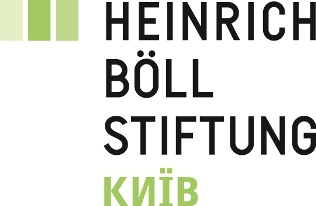
Supported by ERSTE Stiftung and Charles Stewart Mott Foundation


Visual Culture Research Center (VCRC) was founded in 2008 as a platform for collaboration between academic, artistic, and activist communities. VCRC is an independent initiative, which is engaged in publishing and artistic activities, scientific research, organization of public lectures, discussions, and conferences. In 2015 Visual Culture Research Center received the European Cultural Foundation’s Princess Margriet Award.
Visual Culture Research Center (44 Hlybochytska Street (1st floor), Kyiv)
Contacts:
+38096 4929600 (Nataliya Neshevets)
www.facebook.com/vcrc.org.ua
vcrc@vcrc.org.ua
Short course by Serhiy Yekelchyk
Monday – Thursday, 25 – 28 May 2015, 18:30
The Ukrainian Experience of World War II
Visual Culture Research Center (44 Hlybochytska Street (1st floor), Kyiv)
Visual Culture Research Center and Political Critique invite you to a short course by Serhiy Yekelchyk “The Ukrainian Experience of World War II”, which will take place from May 25 to 28 (Monday till Thursday) at 18.30 every day.
The short course aims to outline new approaches to the Ukrainian experience in World War II, using contemporary Western historical scholarship. We will begin with deconstructing of predominate ideas about the war and tracking changes how some narratives replace others, and then we will move on to experiences of ordinary people in wartime, usually hidden by the loud words about courage and sacrifices of the nation. Further, the short course will be focused on relationship between the war and vision of the world in ethnic categories that will allow to see the evolution of the official memory of the war from 1945 until today.
Lecture 1: Narratives of the war.
Lecture 2: Everyday life of the war.
Lecture 3: Nationalization of the war.
Lecture 4: Memory of the war.
Serhiy Yekelchyk is a historian and professor at University of Victoria (Canada). His books include “Stalin’s Empire of Memory: Russian-Ukrainian Relations in the Soviet Historical Imagination” (2004); “Ukraine: Birth of a Modern Nation” (2007), “Ukrainophiles: the World of Ukrainian Patriots of the Late Nineteenth Century” (2010), “Stalin’s Citizens: Everyday Politics in the Wake of Total War” (2014). His latest book about the Maidan and 2013-2014 events in Ukraine is in print.
To enroll, please send an email to vcrc@vcrc.org.ua. You will get readings for the course (scanned pdf files).
The short course will take place as a part of the educational project “Revenge of Memory: World War II in Political and Cultural Narratives”. The project aims to conceptualize World War II discourses, which are perceived through the recent events in Ukraine, to analyze political, rhetorical, and media strategies that use historical experience of the war, as well as to produce new ways of shaping post-war experience.
The project is supported by Heinrich Böll Stiftung (Kyiv)

Supported by ERSTE Stiftung and Charles Stewart Mott Foundation


Visual Culture Research Center (VCRC) was founded in 2008 as a platform for collaboration between academic, artistic, and activist communities. VCRC is an independent initiative, which is engaged in publishing and artistic activities, scientific research, organization of public lectures, discussions, and conferences. In 2015 Visual Culture Research Center received the European Cultural Foundation’s Princess Margriet Award.
Visual Culture Research Center (44 Hlybochytska Street (1st floor), Kyiv)
Contacts:
+38096 4929600 (Nataliya Neshevets)
www.facebook.com/vcrc.org.ua
vcrc@vcrc.org.ua
Lecture by Irina Sandomirskaya
Sunday, 24 May 2015, 19:00
Black Fire on Black Flames:
Corporeal Experience and Political Theory
in Lydia Ginzburg’s “Blockade Diary”
Visual Culture Research Center (44 Hlybochytska Street (1st floor), Kyiv)
Visual Culture Research Center and Political Critique invite you to the lecture by Irina Sandomirskaya, which will take place on Sunday, 24 May, at 19:00.
Critical analysis of the concept of collective memory allows us to see how contemporary academic and political discourse uses collective memory to fetishize and commodify the past and turns it into a symbolic object of commerce and biopolitical management. The blockade successfully resists it, so the entire history of its official memorialization is a history of oblivion and silence of the real experience. The blockade is often presented as something extraordinary, as a state of exception (Giorgio Agamben), a rejection of the law in the broadest sense; thus the blockade becomes incomprehensible and its structures are not being reproduced in other social contexts. “The Blockade Diary” by Lydia Ginzburg, a brilliant theorist of the Leningrad disaster who survived and conceptualized the blockade, has tremendous value for understanding the state of exception as the economy of sense and life, as well as continuity and a deep affinity between “pathology” of the state of emergency and “normal” peacetime.
Irina Sandomirskaya is a scholar of Russian and Soviet literature and language and professor at Södetörn University (Sweden). She is an author of Kniga o rodine. Opyt analiza diskursivnykh praktik (2001) and Blokada v slove: ocherki kriticheskoi teorii i biopolitiki iazyka (2013).
Admission is free
Discussion will take place within the frameworks of educational project “Revenge of Memory: World War II in Political and Cultural Narratives”, devoted to conceptualization of World War II discourse, actualized by recent events in Ukraine, analysis of political, rhetorical, media strategies of instrumentaliation of the historical war experience, production of ways of working with post-war experience.
The project is supported by Heinrich Böll Stiftung (Kyiv)

Supported by ERSTE Stiftung and Charles Stewart Mott Foundation


Visual Culture Research Center (VCRC) was founded in 2008 as a platform for collaboration between academic, artistic, and activist communities. VCRC is an independent initiative, which is engaged in publishing and artistic activities, scientific research, organization of public lectures, discussions, and conferences. In 2015 Visual Culture Research Center received the European Cultural Foundation’s Princess Margriet Award.
Visual Culture Research Center (44 Hlybochytska Street (1st floor), Kyiv)
Contacts:
+38096 4929600 (Nataliya Neshevets)
www.facebook.com/vcrc.org.ua
vcrc@vcrc.org.ua

